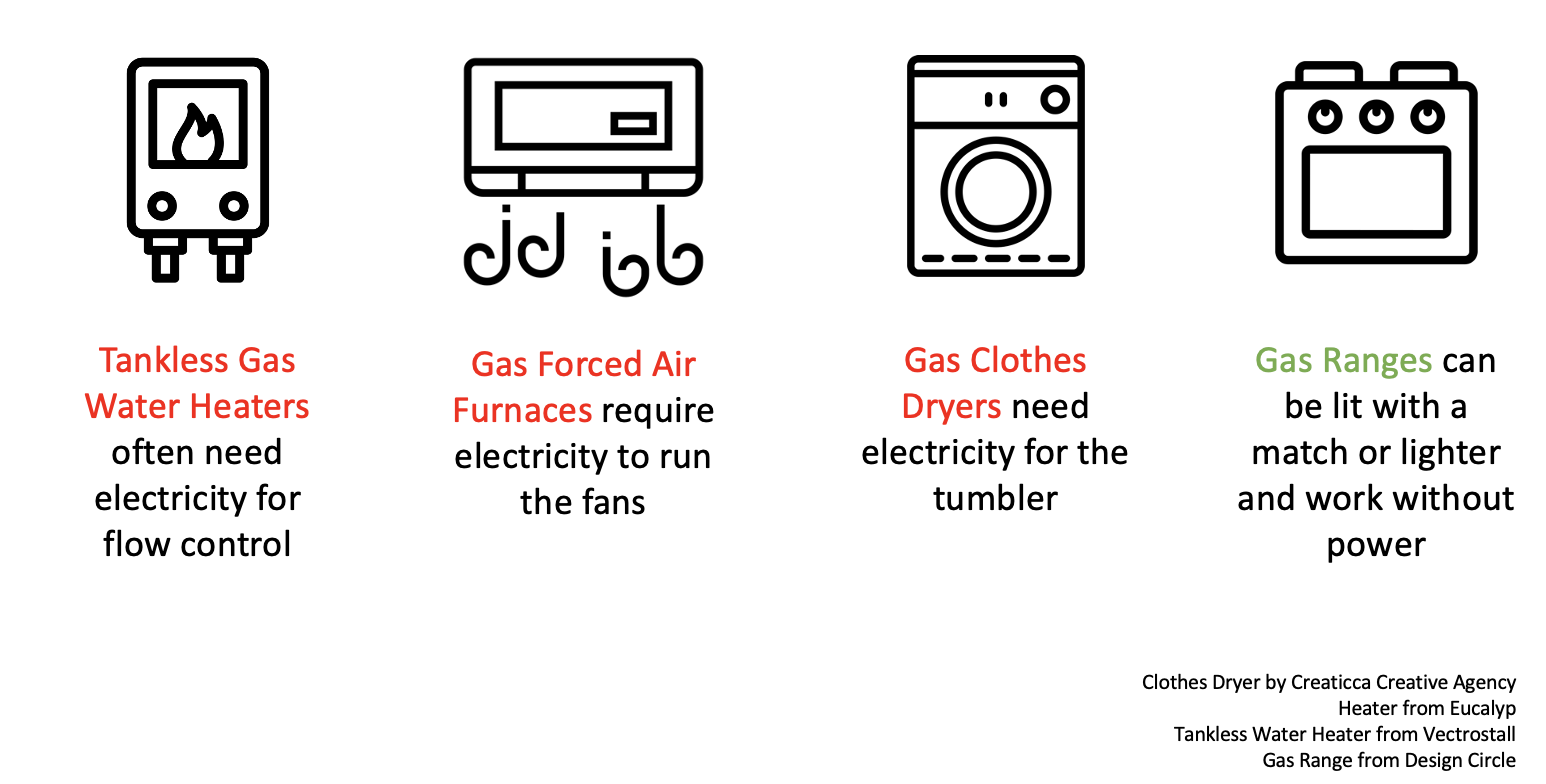This is an absolutely important question. Over the last few months, we saw power outages in Truckee and the West Shore, and as I write this there are communities in the foothills that have been without power for weeks. PG&E, the company that brought you The Dixie Fire, The San Bruno Pipeline Explosion, Public Safety Power Shutoffs, and The Paradise Fire (all while paying their CEO a $6 million severance package) has been unable to meet their duty to serve and keep the lights on. While they are delivering backup generators to their customers, they have not promised to fuel those generators. Legislative solutions are needed, but below are the list of technical solutions.
We Can Do This
First and foremost - we can do this. We can stop burning fossil fuels without putting our lives in jeopardy. We're already doing it, globally:
- There are already all-electric homes in the Tahoe Basin
- 25% of homes in the United States are all-electric, and this issue does not come up often
- The entire nation of Norway - a place that experiences much colder temperatures than us - lives in all-electric buildings (often with wood heating as an option...more on that later)
- Outages are annoying while they are happening, but are very uncommon. The average homeowner experiences a total of 8 hours without power in a given year.
Most Gas Appliances Need Electricity to Operate
There's a theory going around that our gas appliances work without electricity. Usually, they don't. In more commercial buildings, pumps and fans and controls are needed to run water and space heating. While most tank-style gas water heaters work without electricity, a lot off things just fail to function.
How To Think About Staying Comfortable In An All-Electric Home During A Power Outage
A recent Blister Podcast about avalanche safety reminded me of how I think about redundancy in our homes. In the episode, Avalanche forecaster, Zach Guy, goes through what he keeps in his bag when he goes in the backcountry. From the usual suspects, like beacon, shovel, probe, and water - to backup items like phone chargers, bivy sacks, matches, extra clothes etc.
Focusing in on communication is a good metaphor for our homes. Is your phone your navigation tool? What if it loses power? Well, you could:
How can we apply this type of thinking to our gas-fired appliances? I'm going to focus primarily on space heating and water heating. Space heating, because it is a life safety issue. Water heating because you might need a shower, you dirtbag.
Focusing in on communication is a good metaphor for our homes. Is your phone your navigation tool? What if it loses power? Well, you could:
- Break out a paper map - a fool-proof, analog backup
- You could bring a backup battery - which backs up the battery within the phone
- You could use your buddy's phone - full redundancy on the phone
- You could have a Garmin packed away - another type of full system redundancy
How can we apply this type of thinking to our gas-fired appliances? I'm going to focus primarily on space heating and water heating. Space heating, because it is a life safety issue. Water heating because you might need a shower, you dirtbag.
|
Give Your Appliances The Ability to Coast
When we lose power, we do not immediately lose access to all of the services our appliances provide. Everyone should know to keep their refrigerator closed at the beginning of a power outage. Food can stay cool for hours if you keep the door shut. A storage water heater can provide 5-10 showers from the tank without power. This is true for gas, electric, and propane tank-style water heaters. By specifying a larger tank with our electric heat pump water heaters, we can take hot showers for a few days, even when the power is out. Space heating is no different. We call the concept passive design. With good insulation and double-pane glazing, the home can stay warm enough to live for twenty-four hours. This is especially true with apartments and townhomes, which tend to share heat like warm bodies huddling together in a snow cave. Passive design is what has allowed Amory Lovins to grow bananas in Snowmass, CO for decades using zero energy. |
Consider Appliance-Specific Redundancy
This is a low-cost method that most Tahoe homes already employ. most central furnaces need electricity to run the fan. When the power goes out, the heat stops working. Might just be time to light up the old wood-stove. Let's take that thinking through each piece of equipment:
|
|
Install Backup Power
Backup power is the option typically recommended. Backup power systems are sometimes dedicated to the entire homes, but more often power a few key circuits in the event of an outage. Some types of backup power include:
|
Relocate to Backup Shelter
This is on the extreme end. I wouldn't mention it, if there weren't so many camper vans on my street. Emergency shelters are set up during long-duration power outages, but other options are out there:
|
Fixing This Issue At-Scale May Be Easier, Less Expensive,
We can install batteries in every home, or install batteries at substations, like the one across from Gatekeeper in Tahoe City or at Truckee Regional Park. The increase in reliability is likely identical. Due to economy of scale, less batteries are needed if installed at the substation and the cost per installed kWh is lower. Experts can maintain the equipment, rather than homeowners - increasing safety. The risk of of house fire turning into a battery fire is eliminated.
We can install backup generation at every home, or install backup generation at key points in the grid. As with battery-storage, the solution is likely less expensive and safer. At-home backup generation does have safety issues. Backup generators require storage of flammable gases or liquids on-site, can be expensive to operate, and carbon monoxide deaths can occur if improperly installed. They are a viable solution and can be managed at home safely, but moving them off-site, and maintaining them by experts, reduces these risks.
One hundred percent reliability is not possible with anything in life. However, our utilities could get very close with investments such as:
It must be understood that these investments are eventually passed onto us in the form of higher electricity bills. Whether higher energy costs are worth avoiding the few hours or days that the power per year is not an easy decision.
What I do know is that we have four choices: invest in our infrastructure, invest in our individual building reliability, deal with losing access to our appliances every once in awhile, or keep burning fossil fuels in our buildings. To date, we have decided to keep burning fossil fuels. That is not a choice we can afford to make any longer.
We can install backup generation at every home, or install backup generation at key points in the grid. As with battery-storage, the solution is likely less expensive and safer. At-home backup generation does have safety issues. Backup generators require storage of flammable gases or liquids on-site, can be expensive to operate, and carbon monoxide deaths can occur if improperly installed. They are a viable solution and can be managed at home safely, but moving them off-site, and maintaining them by experts, reduces these risks.
One hundred percent reliability is not possible with anything in life. However, our utilities could get very close with investments such as:
- Substation storage
- Grid-scale backup generation
- Under-grounding or wires
- New equipment
- Brush trimming, tree trimming, and tree removal
It must be understood that these investments are eventually passed onto us in the form of higher electricity bills. Whether higher energy costs are worth avoiding the few hours or days that the power per year is not an easy decision.
What I do know is that we have four choices: invest in our infrastructure, invest in our individual building reliability, deal with losing access to our appliances every once in awhile, or keep burning fossil fuels in our buildings. To date, we have decided to keep burning fossil fuels. That is not a choice we can afford to make any longer.


